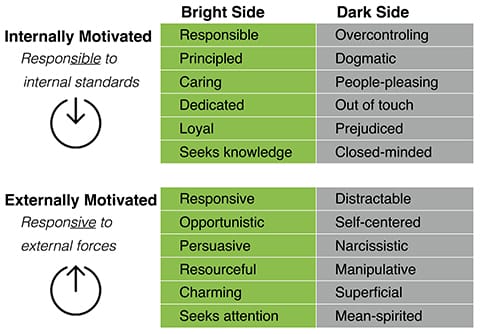
How Should The President Be Motivated?
Share viaIn my previous post I outlined the difference between internally and externally motivated leaders, both the bright and dark sides of their personalities. Which type would be better as president of the United States?
In this post I’ll use this framework to analyze the top two candidates on each side of the presidential race and let you decide. Here’s a re-cap.
The Internals
Bernie Sanders
Sanders is definitely internally motivated. He has a strong set of values and goals, and has been beating away at them for many years with no signs of slowing down. He’s less interested in being popular, more focused on staying the course on his message. You may disagree with his views, but you can count on him to get up every day and work hard towards his goals and beliefs.
Ben Carson
Like Sanders, Ben Carson is most definitely internally motivated. Pretty hard to be in his line of work without some pretty strong dedication and responsibility. His commitment to his values is clear, and he’s been making that more obvious lately. We can predict that if elected president, Carson would work very hard every day to advance his goals and be faithful to his beliefs.
The downside of internally motivated leaders is their tendency toward dogmatism and prejudice. They are quick to criticize those who have opposing points of view, and can get so stuck in their own internal frame of reference that they lose touch with reality. This will limit their effectiveness in a nuanced world.
Look no further than recent government shutdowns and the conflict over speaker of the house to see this in action.
Clinton and Trump are different.
The External
Donald Trump
Trump is externally motivated by the thrill of the chase, the next negotiation challenge, the unexpected turn of events. He doesn’t have an internal, guiding set of values or goals – that would be boring. His primary goal is to get attention and be the winner. Regarding recent polls, Trump was quoted in USA Today as saying,
“I’m a believer in polls. I only like them because I’ve been Number One for 100 days now, which is pretty good. How often do you see polls are wrong? Not too often.”
Polls are external motivation, an external reference point that Trump leverages when it works to his advantage. As president we could count on him to use every ounce of his charm, adaptability, and persuasion to find resourceful solutions, no matter what the problem. When the chips are down, he will look out for his personal interests. If those coincide with national interests, we all win. If not, watch out.
The Blend
Hillary Clinton
Clinton is a mixture of internal and external motivation. She’s doggedly determined and committed to her plan of being president, a plan she has been pursuing longer than most of us have been alive. She has some strong positions on which she is fairly consistent, but also has done some unexpected things (e.g. changing her position on TPA) that might be perceived by internally motivated types as reckless, fickle, or lacking consistency.
Clinton is also very opportunistic and can respond to a changing external climate quite quickly if needed to advance her personal agendas. The difficulty with her mix of motivations is that it can either broaden her base of support because it gives her more tools for getting things done, or it could alienate those from either side of the motivation aisle who wish she was more like them. She would do well to emphasize the positives of both instead of wasting energy defending the dark side. Benghazi is testing her because she probably made some externally motivated choices, but is dealing with an internally motivated inquisition process.
Externally motivated leaders do not, by nature, aspire towards internal values and principles. This can be exceedingly frustrating for internally motivated persons, who can’t understand why they are so fickle, unpredictable, and seemingly self-centered.
The dark side of these types is that they are prone to self-centered, self-serving behaviors and will more likely put their own self-interests over the collective good when in distress.
Trump has done it repeatedly, Clinton has done it periodically. Her husband did it regularly. Does this mean they can’t be great leaders? Absolutely not.
Recognizing internal and external motivation is a great way to predict behavior of your leaders. It also helps shape realistic expectations of how they will behave and why they do the things they do.
Who will you vote for? Consider how they are motivated.
Subscribe to my blog and get posts directly by e-mail.
Follow @NextNate on Twitter
Connect with Nate on LinkedIn
 Buy Nate’s book, Beyond Drama: Transcending Energy Vampires
Buy Nate’s book, Beyond Drama: Transcending Energy Vampires
Book Your Next Keynote Speaker

Author and Co-founder of Next Element, Dr. Nate Regier is available to speak at your upcoming event.
Submit a Speaker RequestPodcast: Listen to Nate "On Compassion"
 Listen to the Podcast
Listen to the Podcast




0 Comments
Add comment